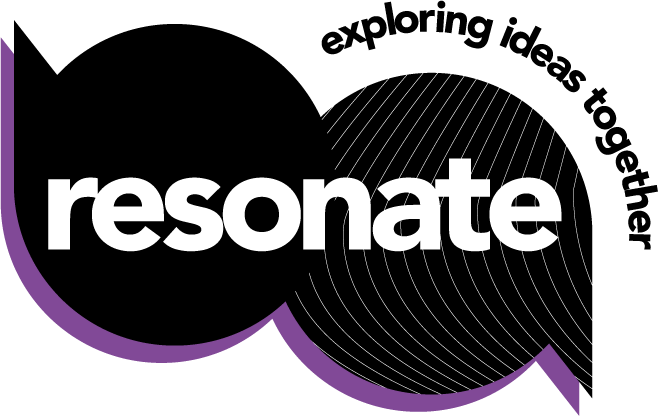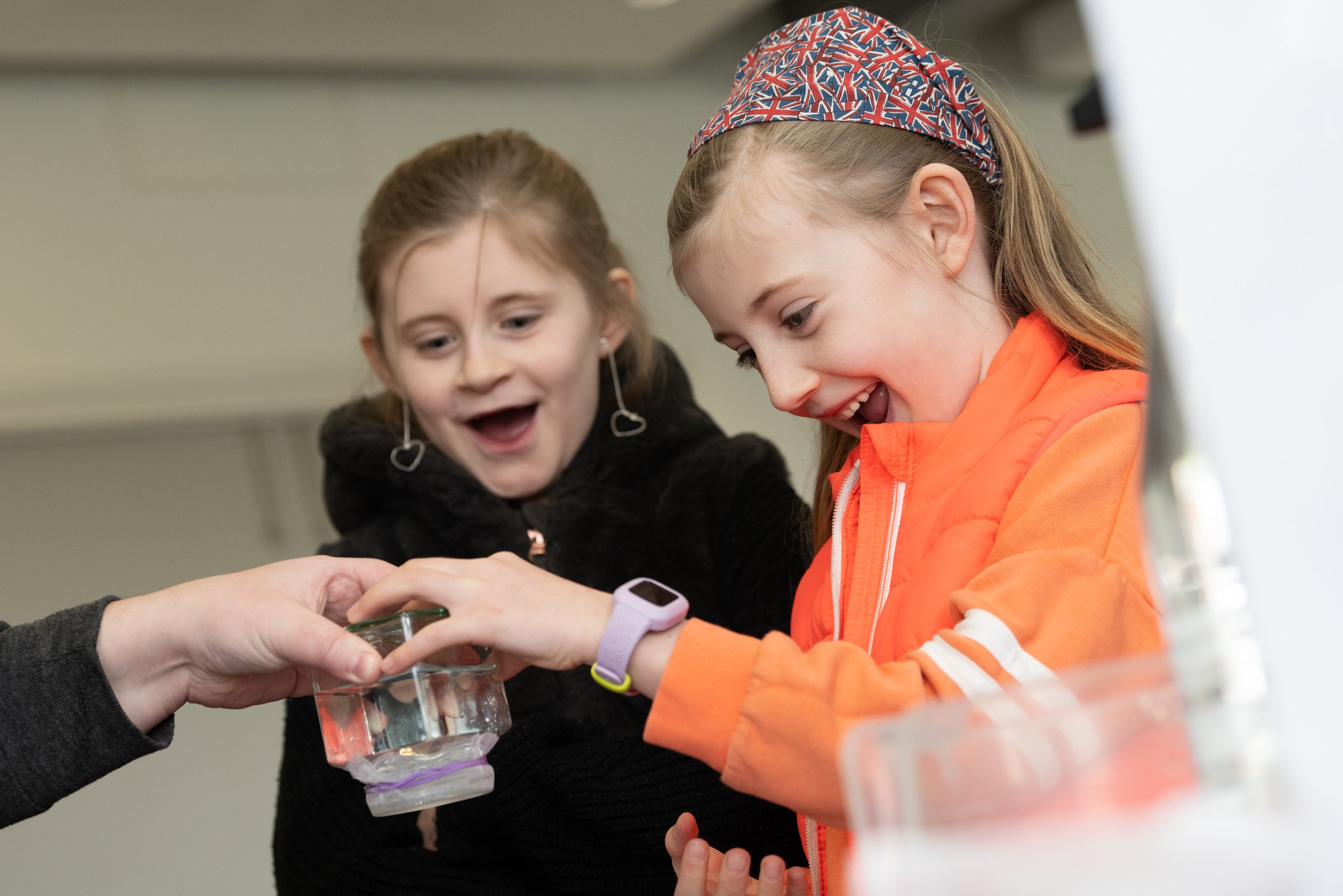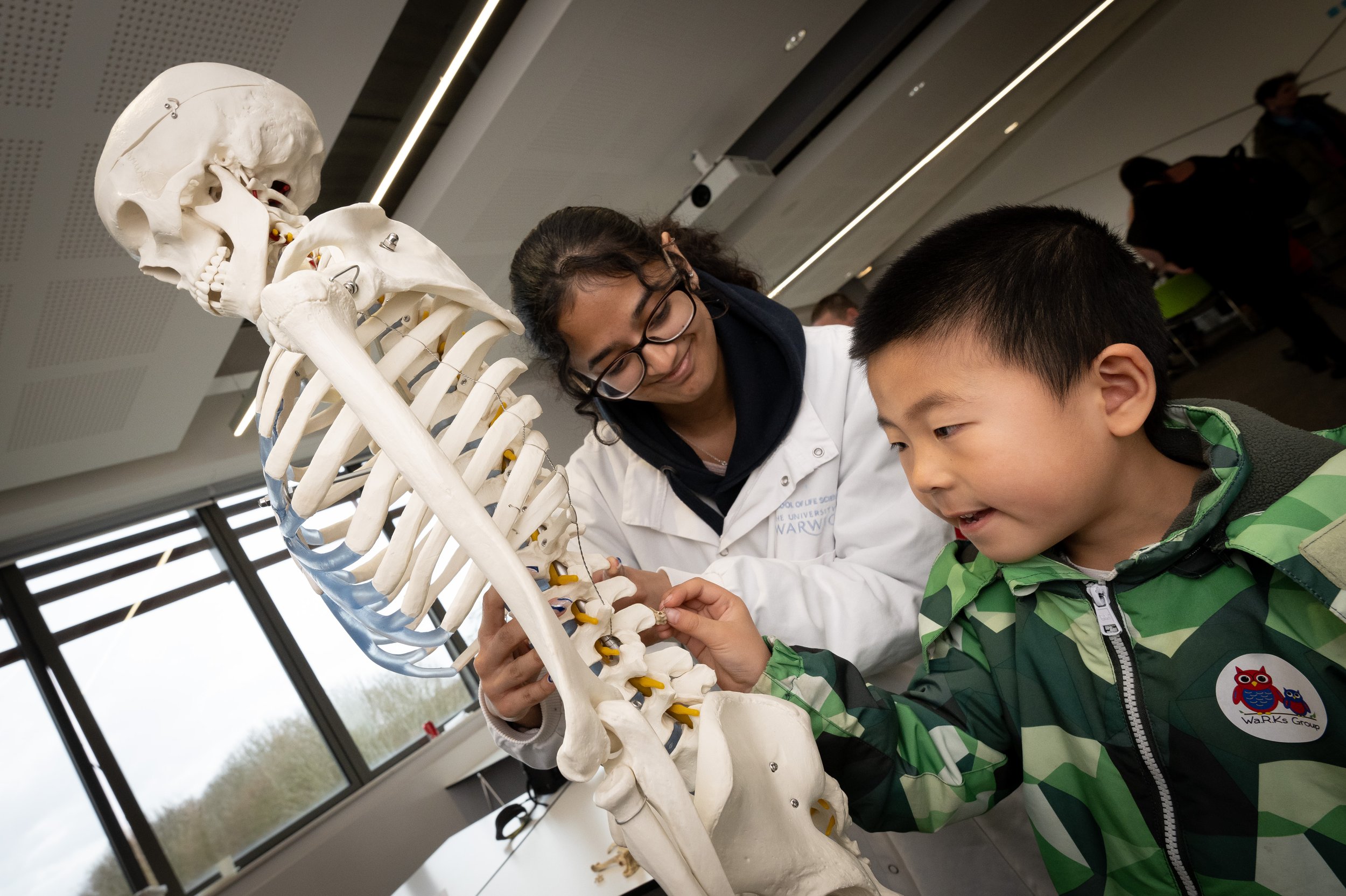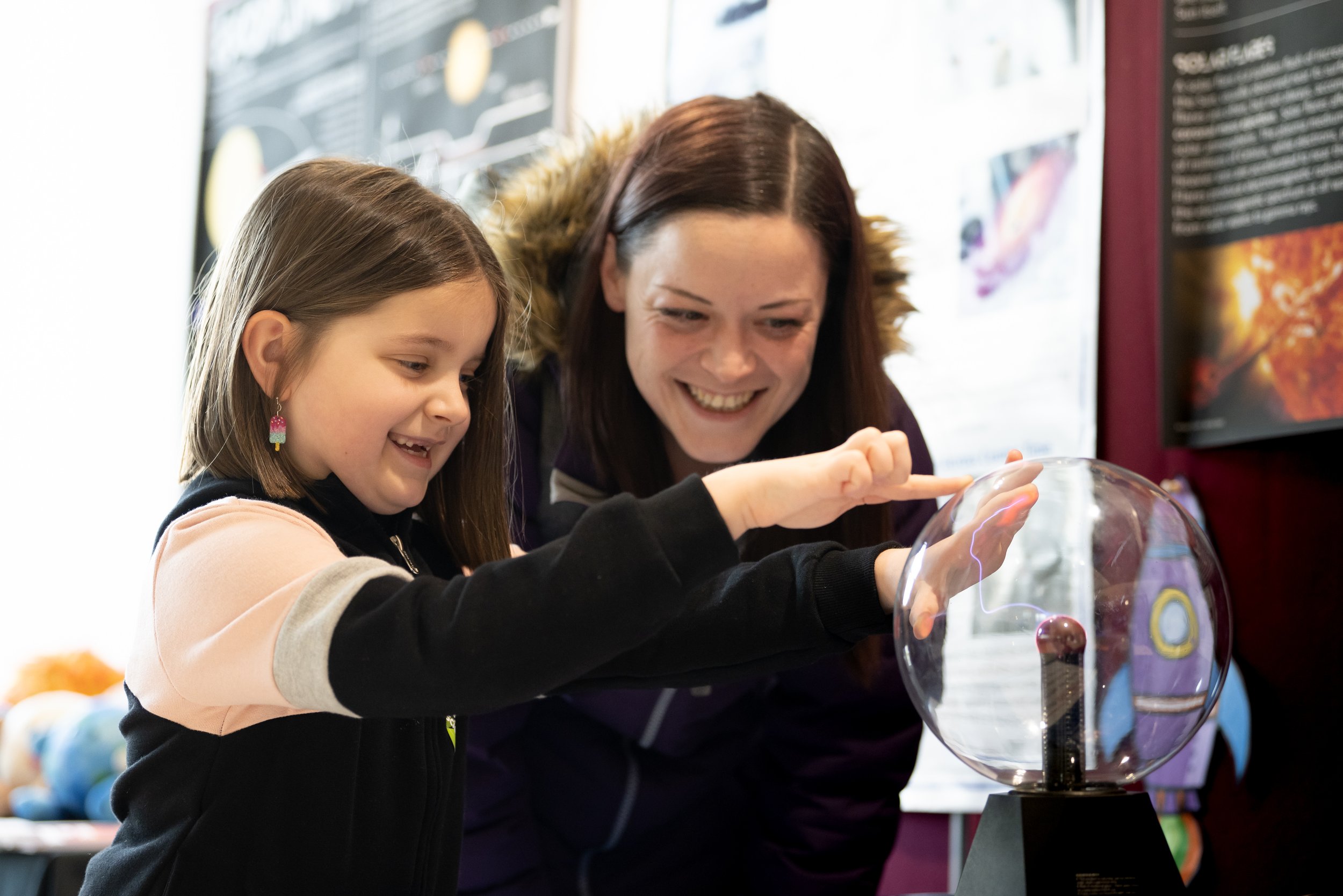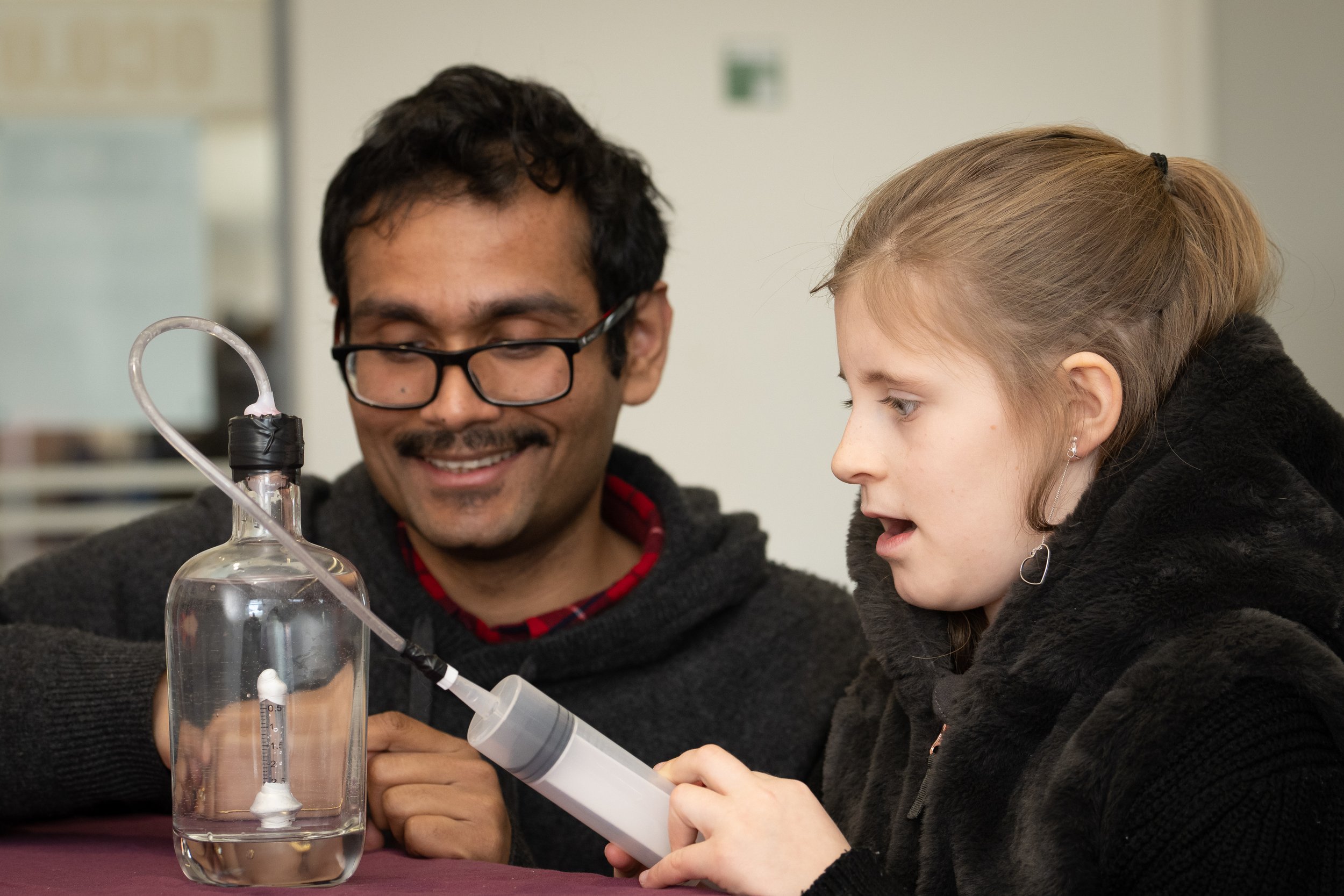A day of fun for all-ages!
In previous years, you may have enjoyed Slice of Science, our on-campus family day. This year you can get hands-on with science again at The Resonate Festival of Science and Technology!
Explore the programme below.
Programme
Timetabled Activity OC0.03
1pm: Exploring Space with Telescopes
Come along and hear from real-life astronomers, who spend their days researching stars, planets, galaxies and more.
2pm: A Day in the Life! Meet our Student Scientists
Ever thought about being a scientist? In this talk, you’ll find out what our student scientists get up to on a day-to-day basis!
3pm: Nature’s Engineers
In this show you’ll be challenged to find the answer to three questions that each combine nature and engineering. With each question comes a demo to explain the answer. You’ll need to bring your shouting voice and stomping feet to make sure the answer picked matches your guess. There will be noise, there will be broken objects and, volunteer willing, there may even be custard pies in the face!!
OC1.07 - Group Challenges
These group challenges encourage adults and children to work together to complete science tasks. To conquer various missions, groups need to Cooperate, Communicate, and use their Creativity.
12.30pm-1.00pm: Fluid Science Experiment
A twist on the classic ring-toss game, this activity will have you exploring how different materials move differently through air.
1.30pm-2.00pm: Aroma Creation Experience
Mix together various liquids to create the best scent and explore the fascinating world of smells!
2.30pm-3pm: Aerospace Engineers Challenge
This task is simple: Who can make the very best aeroplane?
3.30pm-4.00pm: Musical Magicians Challenge
Many objects emit sound. Can we make music from a variety of random objects?
Drop-In Activities, 12pm-4pm
-
Join the engineers from WMG as we get hands-on with robots, control an embroidery machine with code to create your very own beautiful pattern, learn how we can tinker with physics to make exciting demonstrations out of household recycling, and more!
Recommended Age: 7+
-
Come along to talk to real astronomers from the University of Warwick about all things space! We will be hosting night sky tours in our mobile planetarium accompanied with the chance to ask any burning space questions you might have. We will also be showcasing our Astro Table where you will have the chance to control the universe, interacting with objects such as stars, planets, black holes and much more!
Recommended Age: All
Please note: the planetarium is a ticketed event with shows every 30 minutes, please come by OC.02 to get your free tickets.
-
• Fuzzy Bacteria – Cells are in all living organisms, yet their minuscule size makes them challenging to observe with the naked eye. Come along and gain insights into the workings of genes and genetic engineering by simultaneously playing and constructing electric circuits within our "fuzzy bacteria."
• Dinosaur Digs - Learn about fossils, adaptation and the physiology of ancient dinosaurs. What do your bones have in common with a dinosaur? How can we tell if an ancient animal was predator or prey, without ever seeing it in real life? Do you have the skills to excavate our fossils and discover their secrets? Crack the secret code hidden in dinosaur names, and become a junior archaeologist! (ideal for under 10’s)
• Conservation Corner – Learn how disease travels through bird populations in an interactive game and see if you can identify animals just by their tracks
• Slime Science – Learn about the gooey, sticky, slimey side of biology! What do snails, frogspawn, and marshmallows have in common? Why is it better to land on your feet than your hands? Come and get messy!
• Single Cell Analysis - Our body is made up of billions of tiny building blocks called ‘cells’. They have many different jobs, but due to their microscopic size and similar shape are sometimes hard for us to distinguish. I need your help with sorting out the ‘cells’ my sample! (5+)
Recommended Age: There’s something for everyone in this room!
-
Come and do some experiments using everyday, household ingredients!
Submerge 3D wire shapes in a bucket of soap and see what shape bubbles you can create!
See how different viscosity effects how objects move through fluid.
Propel boats with soap and watch how milk and food dye behave when we add soap!
-
Dry Ice Bubbles
Catch smoke-filled bubbles, discover how to pour a gas, and learn more about super cold substances as the department of Chemistry showcases the amazing properties of dry ice!
-
Let’s get crafty! Head to this room to see where art and science meet.
-
A quiet room with a few colouring pages and books. Head in here if you need a break from the hustle and bustle of the day.
Please be respectful of other room users while using this space.
-
• Coding with Sophie – Use coding programme Scrach to help Sophie the Astronaut build and launch her rocket, beat the asteroids, decode the secret alien message and get spaghettified by the black hole!
• White Swarf Stars – Using sand and marbles, this fun activity will show you how stars evolve into white dwarfs and how they help us understand supernovae (6+)
• Warwick University Satellite Project – Explore video, images and artefacts from real space missions (11+)
• Candela VR – University of Warwick students and graduates have created an immersive VR experience. Find out about fusion energy and climate modelling in through these interactive VR headsets
-
Anyone can be an engineer with this Lego rollercoaster activity!
-
Investigate some fascinating objects, get creative and write your one line, science inspired masterpiece!
-
Interactive puzzles and games, as well as the opportunity to create mathematics shapes from origami.
-
Head on over to the Warwick Esports Centre for free use of their amazing equipment! It’s only a 5 minute walk from the Oculus and staff will be there to guide you.
-
Head over to our new Marsh Observatory which features a large 40cm telescope and a state-of-the-art digital imager which lets you observe Solar System objects, stars, exoplanet transits, and galaxies.
Please note: the Observatory is a ticketed event with tours every 30 mins, please pick up your free ticket to claim your space. Shuttle buses will be operating on the day.
